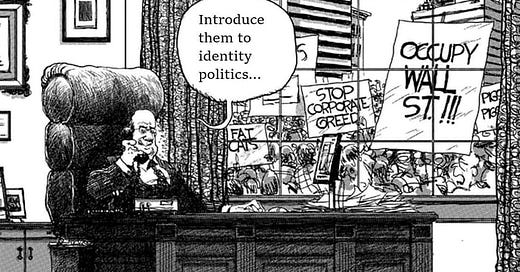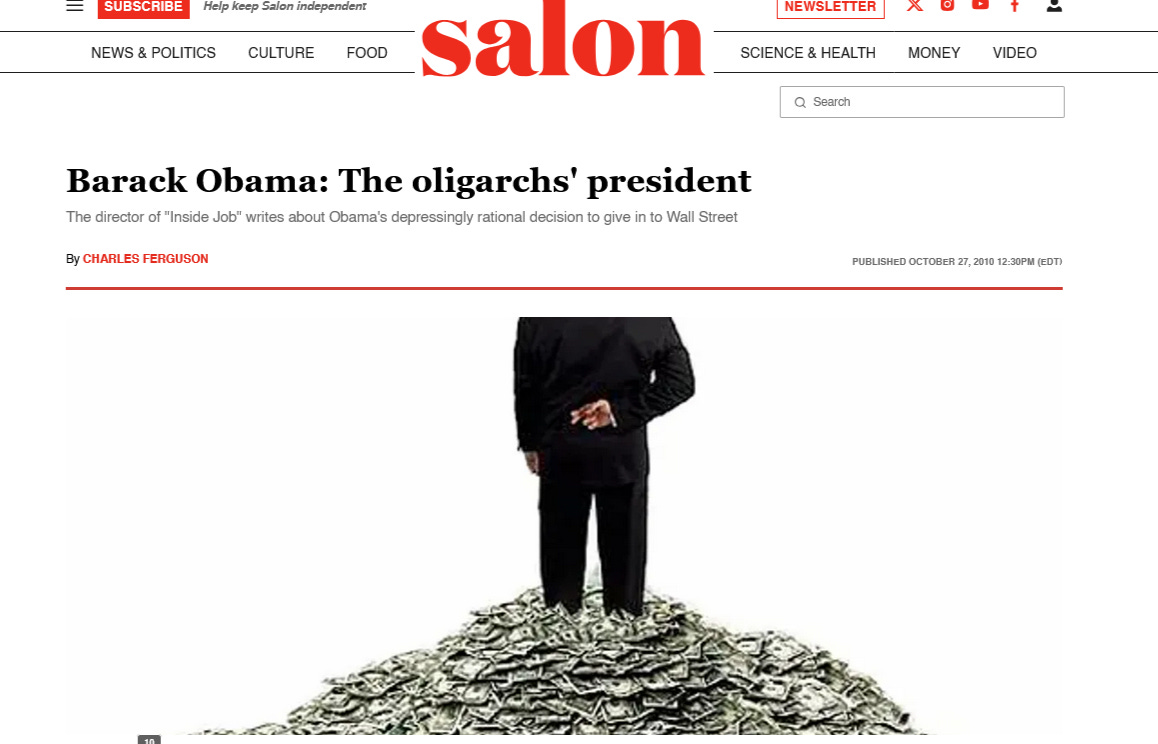Last week Compact picked up an article of mine on the unsung relationship between oligarchy and identity politics in the 21st century. Below is some related discussion on the topic.
Many of my readers will be familiar with the meme below—
—But they may not realize how much truth there is in it. Wall Street, and their proxy at the time, Barack Obama, didn’t decide to launch “Id-Pol” into the center of American politics during the height the Occupy movement; they launched it shortly beforehand, when the collusion between President Obama and the finance oligarchy became so obvious that many leftist leaders were beginning to call it out.
Dr. Cornel West (a former Obama campaigner) and Charles Ferguson (Oscar award-winning director for Inside Job) were among the leading progressives who denounced the president for bailing out criminal banking organizations in the wake of the 2008 mortgage crisis—particularly Citigroup, which also happened to be the home of candidate Obama’s personnel chief, Michael Froman. One could actually argue that Froman was the unsung king-maker behind the first black president.
At Citigroup, Mike Froman was one of the fathers of modern human resources, while simultaneously working as a top Democratic Party operative. In 2004, he plucked a young Chicago politician out of obscurity (they’d been Harvard classmates a decade earlier) and introduced him to Citigroup VP Robert Rubin. This was the same Robert Rubin who, as Bill Clinton’s Secretary of the Treasury, had repealed the banking regulations which enabled toxic assets to destroy the economy. In The Escape Artists, a defining book on the response to the financial crisis, Norm Scheiber recounts:
By the time Froman and Obama were reacquainted in 2004, their paths had thoroughly diverged. Obama was chasing purgatory from the Illinois state legislature. Still Froman knew a good investment when he saw one. He brought his old classmate to see Rubin…
After meeting Rubin, Obama was selected to be a prime-time speaker at the 2004 Democratic National Convention, the first time he ever faced a national audience. “By 2007, [Froman] had thrown himself into the cause of Obama’s presidential prospects. He canvassed the hedge fund world and vouched for the young senator across the Upper East Side.”
Although the bailout of Citigroup originated under George W. Bush, President-Elect Obama made no objections to it, and ultimately expanded it massively. As Scheiber dryly puts it, “Obama had always had a healthier respect for the establishment than the typical insurgent candidate.” The great pillar of the Wall Street establishment was Robert Rubin. His relationship with Obama had uncanny parallels with the one between Elon Musk and Donald Trump:
That Rubin had shaped the Obama economic team was beyond question. Mike Froman, his former Treasury chief of staff and Citigroup colleague, had, after all, been the person in charge of hiring for the entire Obama administration…Anyone who spent much time in the White House complex became accustomed to seeing Rubin wander through every few weeks for another consultation. (Scheiber, p. 85)
The resemblance between Rubin and Musk doesn’t end there. Both men had once been mainstream liberal icons, but Rubin’s “aura had dimmed” as awareness of his corruption grew, leading to a Musk-ian awkwardness in his relationship with the president:
By November 2008, when Citi earned a government bailout made necessary partly by the extra risk-taking Rubin had advocated internally, Rubin was no longer anathema only on the left. Rubin-hatred had gone mainstream…Across the political spectrum, the idea that such a person would enjoy outsize influence in…the administration of a self-proclaimed outsider was nothing short of galling. (Scheiber, p. 86)
By 2011, Obama was facing unrest on the populist left (as demonstrated by the progressive leaders quoted above). It was here that he began a major pivot in his agenda. During his first two years in office, President Obama showed no interest in gay marriage, immigration amnesty or transgenderism, and took a moderate stance on abortion. By the end of the year, his administration was changing course on all these issues, and the president nearly undermined his own healthcare bill by advocating for federal funding of abortion.
In this way, Obama ensured that the national discourse heading into the next election year was centered around culture war, not economics, despite the fact that Obama was seeking a budget-cut “grand bargain” with Republicans at the time which threatened Social Security.
One of Mike Froman’s specialties at Citigroup was fostering identity diversity in human resources. It doesn’t seem like a coincidence that Obama’s first move away from social moderation was his Executive Order to “Promote Diversity and Inclusion” in August 2011, the same month that organizing meetings began for Occupy Wall Street.




